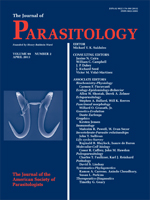To better define the strains and species of Hepatozoon that infect coyotes in the south-central United States, whole blood and muscle samples were collected from 44 coyotes from 6 locations in Oklahoma and Texas. Samples were evaluated by a nested polymerase chain reaction (PCR) using primers amplifying a variable region of the apicomplexan 18S rRNA gene as well as histopathology (muscle only) for presence of tissue cysts. Hepatozoon spp. infections were identified in 79.5% (35/44) of coyotes tested including 27 of 44 (61.4%) whole blood samples and 17 of 44 (38.6%) muscle samples tested by PCR and 23 of 44 (52.3%) muscle samples evaluated by histological examination. Analysis revealed 19 distinct sequences comprising 3 major clusters of Hepatozoon spp., i.e., 1 most closely related to Hepatozoon americanum, another most closely related to Hepatozoon canis, and the third an intermediate between the 2 groups. The diversity of Hepatozoon spp. in wild canids appears greater than previously recognized and warrants further investigation.
How to translate text using browser tools
1 April 2013
Genetic Diversity of Hepatozoon spp. in Coyotes from the South-Central United States
Lindsay A. Starkey,
Roger J. Panciera,
Kelsey Paras,
Kelly E. Allen,
Michael H. Reiskind,
Mason V. Reichard,
Eileen M. Johnson,
Susan E. Little
ACCESS THE FULL ARTICLE

Journal of Parasitology
Vol. 99 • No. 2
April 2013
Vol. 99 • No. 2
April 2013




